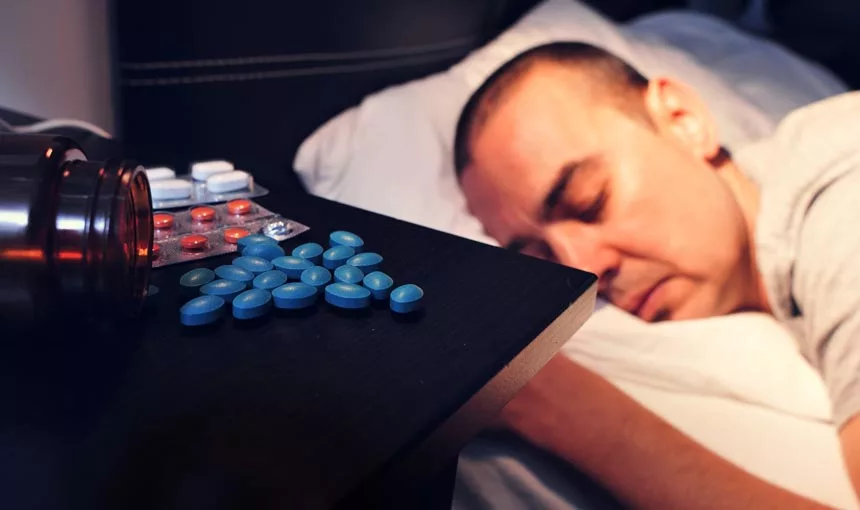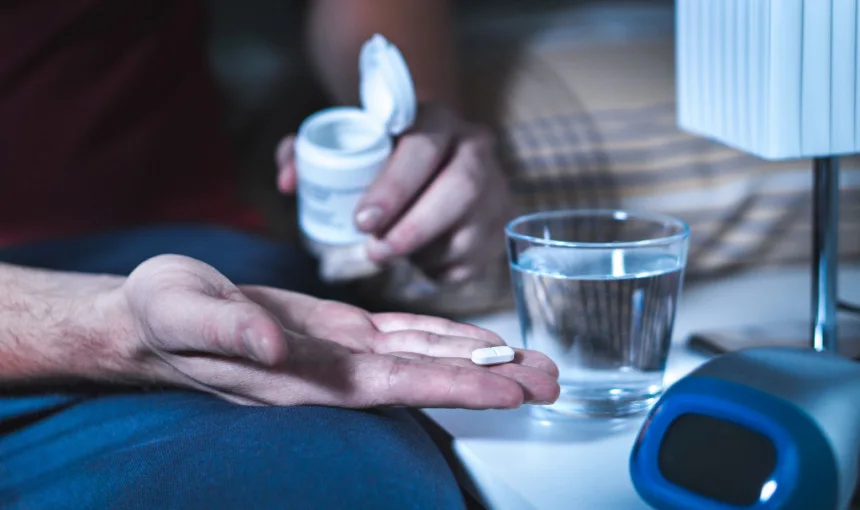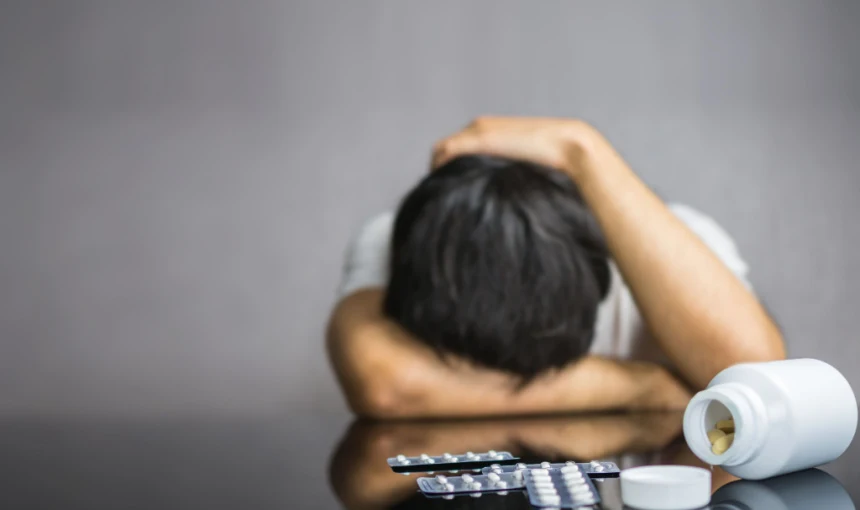What are Sleeping Pills?
Table of Contents
- What are Sleeping Pills?
- What are the Dangers of Sleeping Pills?
- Signs of Addiction to Sleeping Pills
- Side Effects of Sleeping Pill Abuse
- What are the Signs of a Sleeping Pill Overdose?
- What Are The Withdrawal Symptoms From Sleeping Pills?
- Understanding the Sleeping Pill Addiction Treatment Process
- Treatment Options for Sleeping Pills: Found Here
- Medically Reviewed By
Sleeping pills, or “Z-drugs,” refer to prescription sleep tablets commonly used to help treat insomnia and other sleep disorders, as well as anxiety disorders. Some sleeping pills are even prescribed to help reduce seizures and panic attacks.
These include barbiturates, sedative-hypnotics, certain painkillers, benzodiazepines, and other sleep medications. Many of these drugs, of which, are highly controlled substances, despite their various clinical applications.
The most commonly prescribed medications that fall into this category include Lunesta, Sonata, Ambien, and Restoril, amongst several others. While a prescription sleep aid can greatly assist in helping individuals to get a good night’s rest, they do have their drawbacks.
Many of these sleep aids, including prescription refills, are carefully regulated when prescribed, due to the various negative consequences they may have on a user’s health. The primary concern, of which, is the high risk these pose for forming a sleeping pill addiction.
Keep reading to find out more regarding dependence on sleeping pills and how to find effective treatment options!
What are the Dangers of Sleeping Pills?
When someone takes a sleeping pill in any other way than it has been prescribed, or uses it without a prescription, this is considered sleeping pill abuse. When sleeping pills are abused, they can create a feeling of relaxation and euphoria, or what people call a “high.”
The longer someone abuses certain Z-drugs, the more likely they are to start using other, more dangerous methods of administration in order to achieve a faster or stronger high. This includes crushing pills in order to inhale them, or dissolving the powder in an injectable liquid base.
This method of administration not only makes them more likely to form a physical dependence on these drugs, but also increases their risk of overdosing; a side effect that can quickly become fatal if not properly addressed.
Furthermore, many sleeping pill users tend to end up addicted to opioids because they enhance the high these drugs create. However, the combination of these two medications is also very dangerous, as it increases your risk of experiencing an overdose.
According to the National Institute on Drug Abuse (NIDA), overdose deaths involving benzodiazepines gradually increased from 1,135 in 1999 to 11,537 in 2017. Where there was a brief decline in these death rates after 2017, they eventually rose again to 12,290 in 2020.
Signs of Addiction to Sleeping Pills
Sleeping pills are only meant to be taken for a short period of time, usually only over an average period of two weeks. If their prescription sleep aid use extends any longer than that, they run a serious risk of developing a drug addiction.
This happens because the body gets used to the dosage they are taking, requiring them to continue increasing their dosage in order to fall asleep. Over time, this will result in the development of a dependence on these pills, and eventual addiction to them.
If you are trying to determine if you or a loved one is suffering from a sleeping pill addiction, signs that may indicate this or other addiction issues include:
- Needing to use a substance in higher doses or more frequently than usual in order to achieve the desired effect
- Repeatedly being unsuccessful in attempts to reduce or stop the usage of a substance
- Consistently having a hard time fulfilling certain work, school, or home responsibilities and obligations due to substance use
- Experiencing difficulties within interpersonal and external relationships due to substance use
- Frequently experiencing severe and unexplainable mood swings
- No longer participating in previously enjoyable activities or hobbies due to substance use
- Spending significant amounts of time and money acquiring, using, or recovering from substance use
- Experiencing withdrawal symptoms when not using the substance, or attempting to reduce a regular dosage
If more than one or two of these characteristics apply to you or a loved one, this is a strong indicator of an addiction to sleeping pills. The longer someone abuses sleeping pills, the worse these symptoms will become.
Receiving proper, professional treatment advice and recovery support before your addiction gets any worse is your best chance at overcoming these habits of substance abuse.
Side Effects of Sleeping Pill Abuse
In addition to the more “desirable” effects of sleeping pills, people who abuse these drugs may also experience various unpleasant side effects as well. These can be quite dangerous in nature, possibly resulting in long-term, and even irreversible damage if not properly managed.
Short-Term Effects
There are several side effects that may result when taking these medications outside of their intended use. These will be particularly pronounced in individuals who do not necessarily have trouble sleeping, or attempt to fight their sleeping pill’s ability to induce sleep, and may include:
- Fatigue
- Lack of coordination
- Dizziness
- Lightheadedness
- Hallucinations
- Slurred speech
- Inability to focus
- Impaired memory
Furthermore, those who abuse these drugs may experience more intense immediate side effects, including seizures, depressed breathing, and coma. Allergic reactions to various sleep aids are also not uncommon, causing difficulty breathing, chest pain, swelling and nausea.
Long-Term Effects
Someone with a full-blown addiction to sleeping pills who has been abusing them for longer periods of time may develop additional issues to the ones listed above. These include:
- Daytime drowsiness
- Memory loss
- Unusual or disturbing dreams
- Irregular circadian rhythm
- High blood pressure
- Irregular heartbeat
- Depression
Furthermore, while quite rare, these drugs’ effects may also result in the development of parasomnias. These are sleep disorders that cause individuals to engage in potentially dangerous sleep-related activities, such as walking, driving, eating, and more.
There is also the increased risk of overdose that comes with the long-term abuse of sleeping pills, especially if these are combined with other substances.
What are the Signs of a Sleeping Pill Overdose?
People who take sleeping pills according to their doctor’s directions have little to worry about when it comes to overdosing. However, if you take too large of a dose, or combine it with other drugs, you are at an increased risk of having an overdose.
Recognizing the signs of a sleeping pill overdose, whether this is in yourself or someone else who has taken too high a dose of these substances, can be life-saving. These may include:
- Extreme agitation and anxiety
- Blue-tinted fingernails or lips
- Blurred vision
- Confusion
- Difficulty breathing
- Dizziness
- Drowsiness
- Slurred speech
- Tremors
- Unresponsiveness or weakness
The symptoms of a sleeping pill overdose can be different for each person, depending upon how much you took, whether or not you also took other drugs or drank alcohol, and how you took the pills.
No matter what, if you or anyone you know shows signs of a sleeping pill overdose, it is important to seek medical help as soon as possible, as an overdose can be deadly if left untreated.
What Are The Withdrawal Symptoms From Sleeping Pills?
When you are addicted to sleeping pills, this means that your body is used to having them in your system. So, if you suddenly drastically reduce your dosage, or completely stop taking them, you are likely to experience a number of different negative side effects.
This process is referred to as the withdrawal period of an abused substance. Withdrawal symptoms can begin as soon as one to two days after you stop taking sleeping pills. The process usually happens in two to three different phases, which include:
- Early Withdrawal
- Acute Withdrawal
- Protracted Withdrawal
Early Withdrawal
During the early withdrawal phase of this addiction, most people will usually experience an increase in their anxiety or insomnia symptoms of sleeping pill withdrawal.
This includes a condition known as rebound insomnia, in which they may have more difficulty falling or staying asleep than when they first started using their specific medication. They may also experience vivid nightmares when they do sleep.
Acute Withdrawal
The acute phase of withdrawal is the longest, and often the most difficult part of sleeping pill withdrawal. Many people experience both physical and psychological symptoms, including:
- Blurred vision
- Brain fog
- Cravings
- Diarrhea
- Hallucinations
- Insomnia
- Mood swings
- Nausea
- Problems concentrating
- Seizures
- Vomiting
- Weight loss
These withdrawal effects of sleeping pills will usually last between five to seven days, after which they will gradually begin to taper off. However, some individuals may leave this phase and enter into an extended version, known as protracted withdrawal.
Protracted Withdrawal
For people with very severe or long-term addictions to certain types of sleeping pills, protracted withdrawal symptoms can be a concern. These symptoms can last over several months or even years in some cases.
Symptoms experienced during this stage can include prolonged anxiety, depression, insomnia, mood swings, muscle twitches, and tingling in your arms and legs. These symptoms can come and go without warning, but will eventually go away with proper treatment.
Because sleeping pill withdrawal symptoms can be so serious, it is highly recommended that you go through this process at a rehab center. This will give you access to detox programs that help support you through withdrawal, making symptoms less severe and easier to deal with.
This is especially important if you are at risk of having to deal with protracted withdrawal, as without the support of a rehab center, you are far more likely to relapse in an attempt to make these symptoms go away.
Understanding the Sleeping Pill Addiction Treatment Process
When attempting to overcome an addiction to sleeping pills, there are various professional treatment services and options available to help with this. The first step of your recovery journey will typically be a detox program supervised by licensed medical professionals.
As discussed, these will help a recovering individual to stop using sleeping pills safely and avoid any withdrawal signs that might occur. Detox programs often wean you off of sleeping pills over a period of time rather than having you stop “cold turkey,” making this period far less severe.
Upon completing a detox program, the next step in the sleeping pill addiction treatment process will typically be participating in inpatient and outpatient treatment programs. Which of these levels of care a person will choose can vary based on the severity of their addiction.
Those with more intense addictions will be strongly encouraged to recover at inpatient treatment centers, as these will provide more structured and intensive care. They may also offer extensive dual diagnosis treatment plans, which will be beneficial for those with co-occurring disorders.
This may include therapeutic services such as cognitive-behavioral therapy or other forms of behavioral therapy. These can help address not just the sleeping pill addiction in itself, but any underlying mental health issues that may be causing a person’s habits of substance use.
Someone with a less severe sleeping pill addiction, or unavoidable time or financial constraints, may find an outpatient rehab facility more beneficial. These also serve as a step-down level of care after receiving prior care through a detox program or inpatient treatment facility.
Outpatient treatment providers can help reocvering individuals learn stress management and relapse-prevention skills, as well as allow them to participate in recovery support groups. They may also provide therapeutic services that can better help their clients to stay sober.
Seeking out professional medical advice from your medical provider or a certified addiction professional, such as a Find Addiction Rehabs representative, can help you narrow down a specific treatment center and plan that will work best for your recovery needs.
Treatment Options for Sleeping Pills: Found Here
If you or a loved one is struggling with a sleeping pill addiction or any other form of substance abuse, know that you are not alone, and help IS available.
The Find Addiction Rehabs’ mission is to connect people like you with a specific treatment provider and addiction recovery services that are dedicated to providing all of you or your loved one’s personal care needs.
Call our 24/7 hotline now, and we will help you take the first step on your path to addiction recovery, where you can get a good night’s rest every night and live a happier, healthier life, free from the influence of sleeping pills.
Nicole Rogers is an experienced and accomplished writer with special interests in the fields of Anthropology, English, and behavioral health, and has written countless articles for newspaper publications, institutional research journals, and Find Addiction Rehabs.
Her alma mater is Florida Atlantic University in Boca Raton. Nicole hopes to spread awareness of and combat the stigmatization surrounding addiction and substance abuse treatment through her writing and work in the field.






